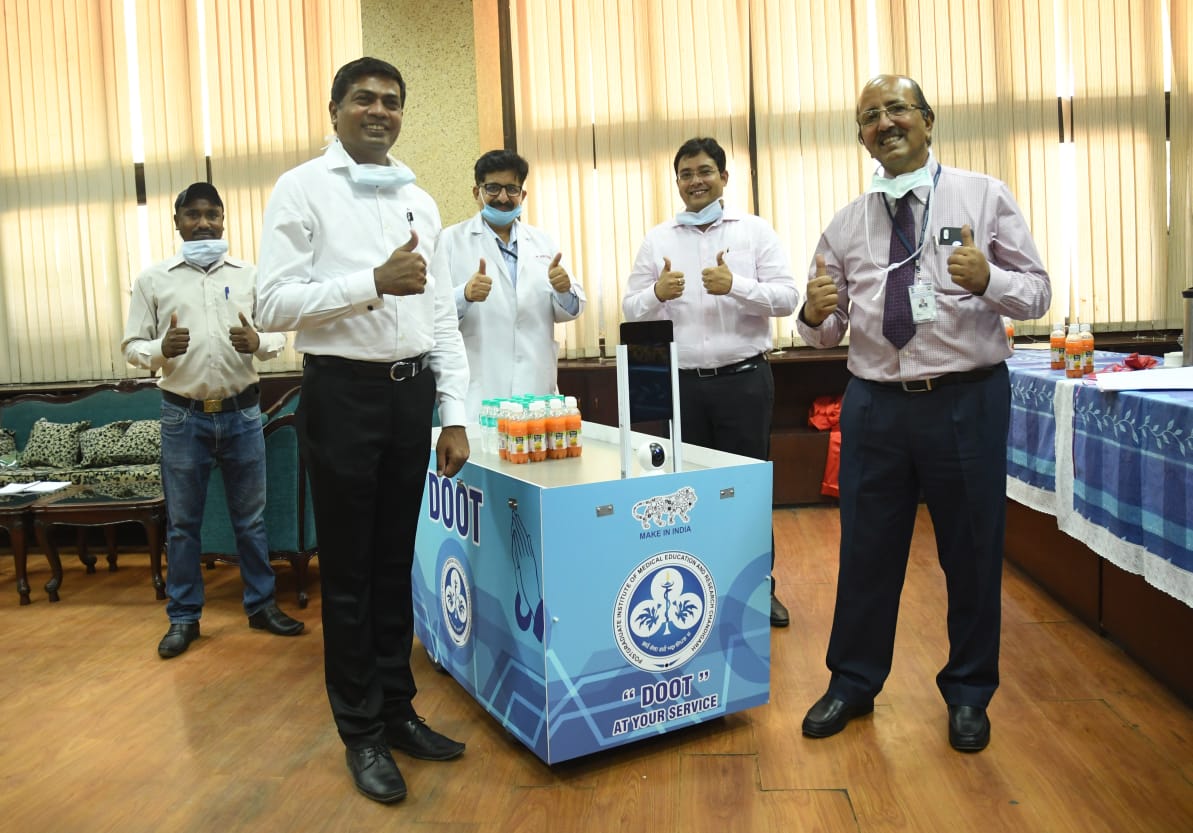An affordable & customized solution for local needs
Director PGIMER launches the device & lauds doctors for their commendable initiative
M4PNews|Chandigarh
With an intent to minimize healthcare workers’ contact with infected patients and contaminated surroundings, PGIMER developed a state-of-the art low cost automated robotic trolley for COVID patients, an affordable and customized solution for local needs.
The device was formally launched by Prof. Jagat Ram, Director PGIMER amid rousing applause here in PGIMER today.The other dignitaries present at the launch ceremony included Prof. G. D. Puri, Dean (Academics) & Head, Deptt. of Anesthesia & Intensive Care, Prof. Gurpreet Singh, Dean (Research) & Head, Deptt. Of General Surgery, Prof. A.K. Gupta, Medical Superintendent cum Head, Deptt. Of Hospital administration, Kumar Gaurav Dhawan, DDA, Kumar Abhay, FA, Prof. Vipin Koushal, In-Charge COVID Hospital, Prof. Ashok Kumar, Addl. Medical Superintendent & Official Spokesperson and senior faculty members and resident doctors
Acronymed as DOOT (Delivery, Observance and an Orchestrated Telecommunicator) this robotic device was designed and developed by two resident doctors from Deptt. of Hospital Administration, Dr. Pranay Mahajan & Dr. Shailesh Gahukar.
Speaking at the Launch Ceremony, Prof. Jagat Ram, Director PGIMER lauded Dr. Pranay Mahajan and Dr. Shailesh Gahukar for their commendable initiative and stated, “The health and safety of our front line corona warriors is always our utmost concern as they are putting their own lives at risk to save the lives of others. This robotic device is PGIMER’s step forward in the direction of self reliance and safety. By delivering medicines and food among patients in the isolation wards wherein the chances of getting infected with the virus are maximum for the healthcare workers, this automated trolley will help in reducing their interaction with COVID-19 patients to a great extent.”
Prof. Vipin Koushal, In-Charge COVID Hospital, who ideated and conceptualized the device, remark. “With the spikes in numbers of positive patients earlier,we were brainstorming about multiple affordable options to ensure better safety for our COVID-19 team in addition to SOPs being followed. That’s how DOOT came into being. It is special, affordable and customized solution for our local needs. It was quite a challenge as well as it was developed during lock down period when nothing was available in market. Still it was managed within a nominal budget of Rs.25000/- with the constant support Engineering department of PGIMER,”
Apprising the house about their indigenous and low cost solution, Dr. Pranay Mahajan, Deptt. of Hospital Administration shared, “We decided to devise a low-cost solution and started working on it. Initially while designing, we considered that a Motorized Trolley should reach the bed of patient and should deliver food, water, medicine etc. reducing the risks involved in contact between healthcare workers and patients. Later, apart from designing just a ‘Low-Cost’ &‘Remotely Operable’ trolley, we attached App-based Cloud Camera to the Robotic Trolley that empowered it with additional features like motion sensing, night vision, thermal sensing embedded with an online signaling system which would help in remote observation of contaminated areas.
“It has capability of 360° High Definition view of surroundings with cloud storage of videos captured. The battery backup is customizable which can be enhanced upto 4 Days,” added Dr Mahajan.
Throwing light on how DOOT can be leveraged beyond COVID, Dr. Shailesh Gahukar shared, “DOOT is not just for COVID but its utility is beyond this period. We all know that after witnessing the latest COVID Pandemic, the scenario would considerably change and emphasis would be on Physical Distancing and minimal human interactions at avoidable places.
Hence, another value-addition is provided by the Tab mounted on this product, which besides enabling telecommunication with patients, also assists in delivery notification and extra features like welcome messages, music and delivering informational videos. The same can also be used for collecting orders from different sites without need of individual devices at each point.”
After this first step, the resident doctors shared that V.02 of DOOT would be empowered with customizable designs as per utility, totally based on Internet of Things, obstruction sensors, autonomous navigation, increased used of Artificial Intelligence and many more features.
The work has already been started and a ‘MediBOT’- the next gen of DOOT would be delivered soon. MediBOT would be a part of hospital automation revolution, be it transferring of patient, delivery of medicine and supplies or collection of biomedical waste, MediBOT will do it, reducing risk of our healthcare workers from many deadly infections and occupational hazards, the resident doctors concluded.

